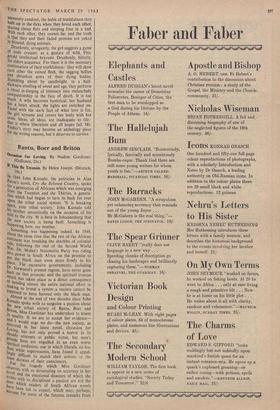Bantu, Boer and Briton
Occasion for Loving. By Nadine Gordimer. (Gollancz, 21s.) IN 1944 John Kumalo, the politician in Alan Paton's novel, Cry the Beloved Country, spoke for a generation of Africans which was emerging fro „ the Twenties and the Thirties, a genera- "on which had begun to turn its back for ever upon the tribal social system. 'It is breaking apart, your tribal society,' John Kumalo told his brother sarcastically on the occasion of his
visit to the city. is here in Johannesburg that the , new society is being built. Something is happening here, my brother.'
Something was happening indeed. In 1949, about the same time that the rest of the African continent was breaking the shackles of colonial rule, following the end of the Second World War, Dr. Malan's Nationalist Party was riding into power in South Africa on the promise to put the black man even more firmly in his place. The successive governments, including Verwocrd's present regime, have never gone back on that promise; and the spiritual erosion Which has taken place as a direct consequence 01 bending almost the entire national effort to Making so brutal a system a success cannot be supposed to have harmed only the black man. Almost at the end of two decades since John Kumalo spoke with so sanguine a passion about tIlle new urban society of Bantu, Boer and
Its quality. Miss Gordimer has undertaken to assess
quality. If we are to accept her evidence— and 1 would urge we do—the new society, as Int irrored in her latest novel, Occasion for ,°Ping, has not only proved a horror in its shoddy attempts at public virtue, but men's private lives are engulfed in an even worse Spiritual confusion, one in which liberals, no less than white supremacists, have found it appal- lingly difficult to match their actions to the Inner dictates of their consciences. For the tragedy which Miss Gordimer observes with so devastating an accuracy in her novel and the emotional disasters of which she _writes with so disciplined a passion are not the have which readers of South African novels account been led to expect, which may, perhaps, 'count for some of the fatuous remarks from
the London critics which greeted her latest novel. Miss Gordimer is a consummate enough novelist to steer away from the clichés and the public gestures of her inferiors. In this novel there are no jackboot arrests, no physical violence—indeed the failures of her people lie deeper and in more liberal quarters. They are personal failures which reflect the warping of much worthier personalities than those belong- ing to the rather comically sad followers of Dr. Verwoerd's party. In a society which does not
grant its members possibilities for full growth— in this case for loving one's fellow men what- ever their skin colour--it is the liberals who
suffer a harsher judgment from their consciences and not those whose very hatred is sanctioned by the society.
And no one learns this sooner than Tom and Jessie Stilwell, a liberal history professor and his wife, whom we first meet in the begin- ning of the novel pondering whether or not to take into their house a South African musico- logist, Boaz Davis, who returns to South Africa with his young wife, Ann, after an absence of some years in Europe. Moments of revela- tion for the Stilwells come with the rubbing together of the four personalities, and then, supremely, when another, a black man, Gideon Shibalo, intrudes into their lives by falling in love with Ann Davis.
With a ruthless honesty, Miss Gordimer re- veals the emotional inconsistences and inade- quacies, the hidden liberal equivocations, in these otherwise worthy and eminently civilised people. Even Boaz Davis doesn't treat Gideon Shibalo as a real rival because he is black. 'There's Boaz,' says Jessie Stilwell, 'he's so afraid of taking advantage of. Gideon's skin that he ends up taking advantage of it anyway by refusing to treat him like any other man.'
With her earlier works, especially the collec- tions of short stories, Miss Gordimer's style had given me cause for worry. Elegant, muted, relying on minor shifts of mood and inner catastrophes, it had seemed eminently unsuited to deal with a continent so turbulent, violent and destructive. And yet in this novel, despite the appearance of the same masterly control and technical discipline, there is happily a surprising passion and density of feeling. The violence is there, the more effectively felt for not being explicit. Though Tom 'Stilwell and BOaz Davies remain remote 'characters to me, it is Miss Gordimer's enviable achievement that she has penetrated the skin of Gideon Shibalo, the African intellectual, who is totally believable. Miss Gordimer is not the one to give us stereo- types of 'song and dance Negroes.'
Though I am a great admirer of Helen Joseph, of her political work and her unchallengeable courage, unhappily I cannot say the same of her writing. If This Be Treason is Mrs. Joseph's account of the recent treason trial proceedings against 156 black and white opponents of the present regime in South Africa and some of the hardships they endured in the custody of the The book is marred by sticky senti- mentality and • an unconquerable proneness toward chattiness. In fact, on the whole, this work adds very little to what has already been written about the treason case or the South African police's draconian methods of dealing with people presumed to be opponents of the State. One would have wished that Helen Joseph's book made a better sequel to Anthony Sampson's rather hasty casebook, The Treason Trial, and Lionel Foreman's The South African Treason Trial.
LEWIS NKOSI















































 Previous page
Previous page